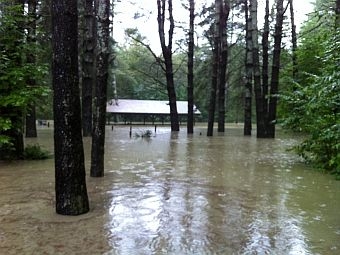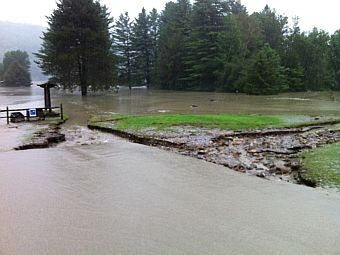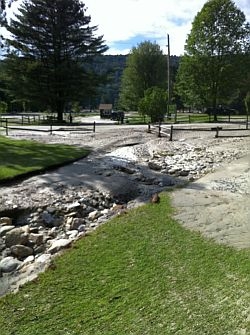 (Host) This week,
(Host) This week,
Commentator Tom Slayton visited Camp Plymouth State
Park, which is now back in operation,
but a year ago was ravaged by Tropical Storm Irene
SLAYTON: Buffalo Brook today is a quiet stream, splashing gently over stones
where prospectors once mined for gold. A single stride and you’re across it.
But when Tropical Storm Irene blew into town, the brook changed.
Ranger
Chris Saylor at Camp Plymouth State Park knew trouble was coming that morning
of August 28 when he heard the brook — from inside his house. "It sounded," he
says, "like a freight train."
There
had been a good steady rain through the night, but that morning it became
torrential. And then everything exploded.
 The
The
brook began roaring, and underneath the roar, Saylor could hear the grinding
rumble of boulders the size of watermelons – big watermelons – being rolled
down the stream bed.
The
brook empties into Echo Lake, one of a string of glacial lakes that follow the
narrow north-south valley from Bridgewater down toward Ludlow.
But
with water gushing down every hillside in town, Echo Lake was rising fast.
Roads were giving way under the onslaught of rocks and water, and, like many
people throughout Plymouth, Saylor suddenly found himself, his family, some
park volunteers and a few campers isolated. Suddenly the water was three feet
deep rushing over his parking lot and it was six feet deep by his concession building. It was
flowing fast; and it continued to rise.
The
main roads in Plymouth follow the valleys, just like the streams. And when
Irene socked Plymouth, those
streams rose up and destroyed the roads. Many valley houses were flooded,
washed off their foundations, and destroyed.
 Throughout
Throughout
the hilly town, people were isolated. Ranger Saylor and his little band of 16
people holed up in a nearby cabin that was on dry ground. They were there for
several days. Across town in Calvin Coolidge State Park, Ranger Bill Schreiber
and his wife took an elderly camper into their home for a week. The tiny
village of Plymouth, where President Calvin Coolidge grew up, had food
for the area brought in by Blackhawk helicopters.
And
that was the story throughout town.
People
first survived the storm, then when the rains abated, they looked around for
their neighbors, rebuilt their roads, and began digging out.
Today,
in a clearing at Camp Plymouth, there’s a huge pile of silt, sand, and gravel.
It’s easily 10 feet tall and 100 feet long, about 35,000 yards of material.
That’s just part of the debris left by the flood; it was collected off the camp
grounds by bulldozers and dump trucks. And now in true Vermont fashion, it’s
being recycled – Saylor and his crew are using it to resurface the camp’s paths
and roads.
 Today the park is open and
Today the park is open and
Buffalo Brook once again flows quietly, bubbling over the rocks where
prospectors once looked for gold, making its way into Echo Lake.